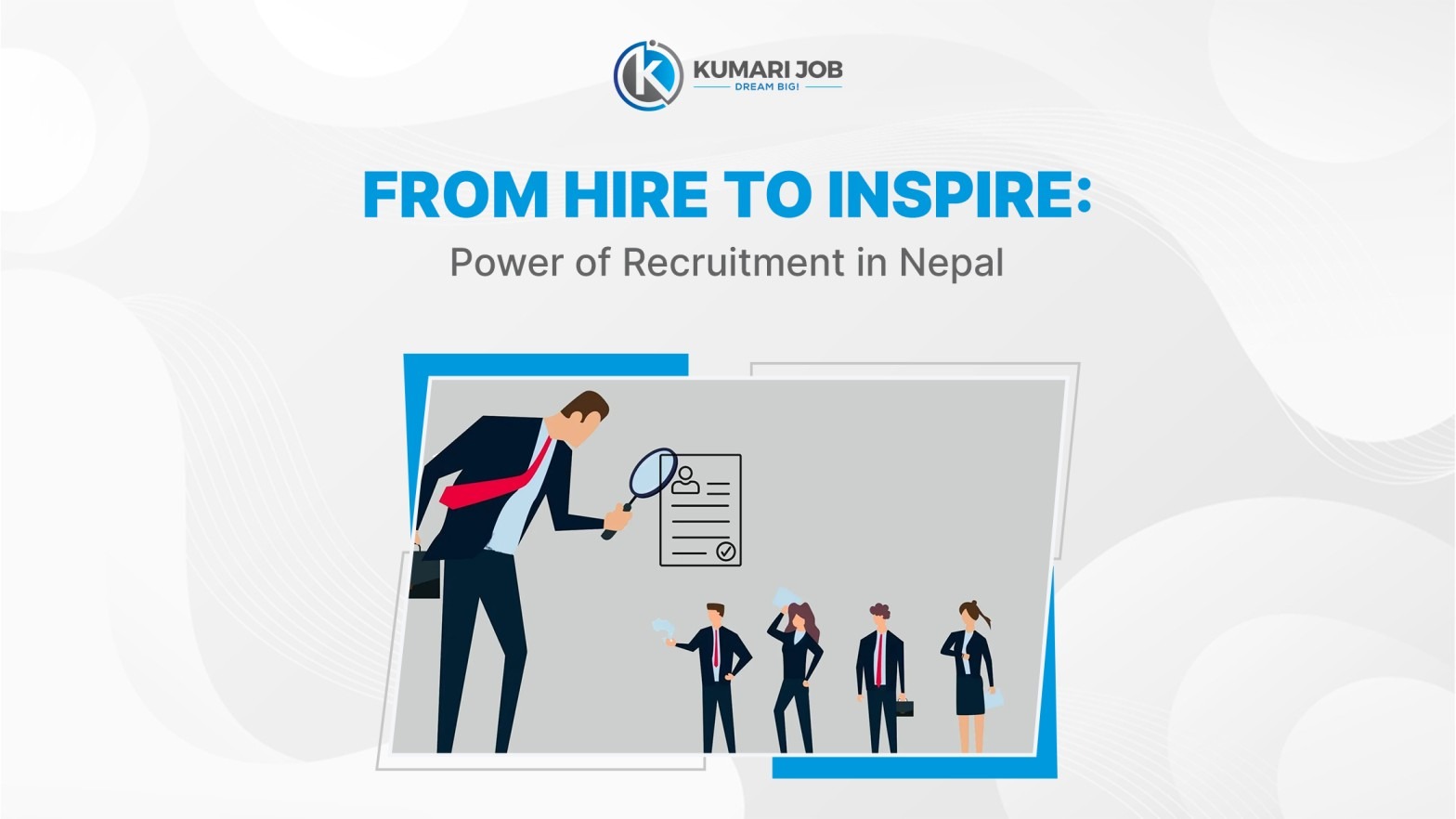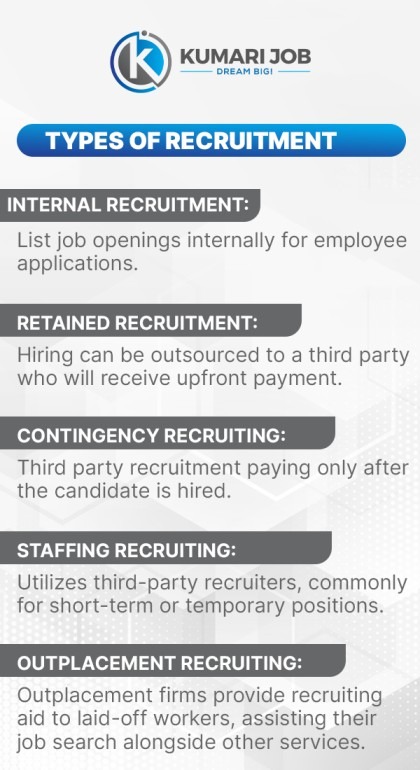
What is recruitment?
Recruitment is the process of attracting and selecting qualified individuals for job openings within an organisation. It involves posting, screening resumes, conducting interviews, and making job offers. The goal is to find the best-fit candidates with the necessary skills and experience for organisational success. Recruitment is a crucial aspect of human resource management, involving sourcing, attracting, and selecting candidates to fill managerial positions. It involves identifying staffing needs, creating job descriptions, and disseminating these descriptions through channels like job boards, social media, and recruitment agencies.
Successful recruitment involves hiring individuals with the competencies needed to meet and contribute to an organisation's objectives. This process enhances performance, fosters innovation, and maintains a competitive edge. It's an ongoing process that includes building talent pipelines, nurturing candidate relationships, and continuously refining recruitment strategies to meet evolving business needs.
In this blog
Importance of recruitment in business.
Recruitment plays a pivotal role in the success and growth of businesses for several reasons:
1. Acquiring Talent: Recruitment is essential for businesses to acquire the right talent to fulfil their staffing needs. By attracting skilled and qualified individuals, organisations can ensure they have the expertise necessary to drive productivity, innovation, and overall performance.
2. Maintaining Competitiveness: In today's competitive business landscape, having the right talent can provide a significant competitive advantage. Effective recruitment allows companies to stay ahead by securing individuals with specialised skills, knowledge, and experience to help them outperform competitors.
3. Fostering Innovation: Recruiting diverse talent with different perspectives, backgrounds, and expertise fosters creativity and innovation within an organisation. Fresh ideas and unique approaches brought by new hires can lead to breakthroughs, product improvements, and process innovations,keeping the business agile and adaptable.
4. Building a Strong Culture: Recruitment is crucial in shaping organisational culture. By hiring individuals who align with the company's values, mission, and vision, businesses can cultivate a positive work environment where employees are engaged, motivated, and committed to achieving common goals.
5. Driving Growth: Effective recruitment enables businesses to scale and expand operations by ensuring they have the right people to support growth initiatives. Whether entering new markets, launching new products, or expanding services, having a talented workforce is essential for driving sustainable growth.
6. Reducing Turnover: Strategic recruitment practices contribute to lower turnover rates by hiring qualified candidates who fit well within the organisation's culture. By investing in the right people from the start, businesses can reduce recruitment costs associated with high turnover and maintain continuity in operations.
Process of recruitment
Recruitment is vital for businesses as it directly impacts their ability to attract, retain, and develop top talent, thereby driving performance, innovation, and long-term success.
The recruitment process typically consists of the following seven phases:
1. Identifying Hiring Needs: This phase involves understanding the organisation's staffing requirements, including the number of positions needed, their roles, and the qualifications required for each position.
2. Job Posting and Advertising: In this phase, job descriptions are written and posted on various platforms, such as job boards, social media, and the company's website, to attract potential candidates.
3. Candidate Screening: This phase involves reviewing resumes, cover letters, and applications to shortlist candidates who meet the job requirements. Screening may include preliminary phone interviews to assess candidates' basic qualifications and interest in the position.
4. Interviewing: Qualified candidates are invited for interviews, which may include multiple rounds with stakeholders such as hiring managers, team members, and executives. Interviews help assess candidates' skills, experience, cultural fit, and suitability.
5. Assessment and Evaluation: Candidates may undergo various assessments such as skills tests, personality assessments, and background checks to evaluate their suitability for the position further.
6. Offer and Negotiation: Once a suitable candidate is identified, a job offer is extended, including compensation, benefits, and start date. Negotiations may occur to finalise terms and conditions.
7. Onboarding: The final phase involves integrating the new hire into the organisation. This includes orientation, training, and providing necessary resources to ensure a smooth transition into the role and company culture.
Throughout these phases, effective communication with candidates, hiring managers, and other stakeholders is essential to ensuring a positive recruitment experience for all parties involved.
What is a job recruitment agency? Why is it important?
A job recruitment agency, also known as a staffing agency or employment agency, is a firm that specialises in matching job seekers with employers who have job vacancies to fill. These agencies act as intermediaries between companies looking to hire and individuals seeking employment. Recruitment agencies typically maintain a database of job opportunities across various industries and professions and a pool of candidates with diverse skill sets and experiences.
In Nepal, recruitment agencies play a crucial role in the competitive job market. They maintain databases of job openings and a pool of qualified candidates. These agencies streamline the hiring process for employers by efficiently sourcing and screening candidates. For job seekers, they offer access to a broader range of opportunities and assistance with resume writing, interview preparation, and career guidance. Specialisation in specific sectors or professions allows for more targeted matches, increasing the likelihood of successful placements.
The importance of job recruitment agencies lies in several key factors:
1. Expertise and Specialization: Recruitment agencies often have specialised knowledge and expertise in specific industries or sectors. They understand employers' unique hiring needs and challenges in those sectors, allowing them to provide targeted recruitment solutions. This expertise ensures job seekers are connected with opportunities aligned with their skills and career aspirations.
2. Access to a Wide Network: Recruitment agencies have extensive networks of employers and job seekers, enabling them to reach a broader audience than individual companies or candidates might on their own. This network includes active job seekers actively seeking employment and passive candidates who may not be actively looking but are open to new opportunities.
3. Efficiency and Time Savings: Employers can save time and resources by outsourcing their recruitment needs to agencies. Recruitment agencies handle tasks such as sourcing candidates, screening resumes, conducting interviews, and coordinating the hiring process, allowing employers to focus on their core business activities. This efficiency can lead to faster hiring cycles and reduced time-to-fill for vacant positions.
4. Access to Talent: Recruitment agencies offer job seekers access to a wide range of job opportunities that may not be advertised elsewhere. Additionally, agencies often have insider knowledge of available positions. They can provide valuable insights and guidance throughout the job search process, including resume writing tips, interview preparation, and salary negotiation assistance.
5. Flexibility and Temporary Staffing: Recruitment agencies are vital in providing businesses with temporary and contract staffing solutions. This flexibility allows companies to quickly scale their workforce up or down in response to changing business needs, seasonal fluctuations, or project-based work.
Overall, job recruitment agencies serve as valuable intermediaries in the labour market, facilitating connections between employers and job seekers while providing expertise, efficiency, and access to talent for both parties involved.
Introduction of Headhunting Firm
A headhunting firm is a professional service organisation specialising in identifying, attracting, and recruiting highly qualified individuals for senior-level or executive positions and focusing on top-level executives and specialised professionals. Headhunting is the strategic process of identifying and targeting individuals with desired skills and qualifications for critical leadership roles, often using networking, research, and direct outreach.
Headhunting firms thoroughly evaluate potential candidates, assessing their suitability for the position and the organisation's culture. They help organisations secure top talent for leadership positions, particularly in competitive industries or niche markets. They leverage their expertise, networks, and industry knowledge to recruit executives and professionals for business growth, innovation, and success.
The functions of headhunting firms are
1. Specialized Recruitment Service: Headhunting, often facilitated by executive search firms, is a specialised recruitment service focusing on identifying and attracting top-level executives and senior managers for key leadership positions within organisations.
2. Exclusive Engagement: Executive search firms typically work exclusively with client organisations, meaning they are contracted to fill specific high-level positions. This arrangement allows for a dedicated and targeted approach to sourcing top talent.
3. Proactive Approach: Headhunting involves a proactive approach, unlike traditional recruitment methods where candidates apply for job openings. Executive search firms often seek potential candidates with the desired skills, experience, and qualifications through networking, referrals, and direct outreach.
4. Market Research and Analysis: Headhunters conduct extensive market research and analysis to identify potential candidates and understand industry trends, market dynamics, and competitor landscapes. This helps in targeting suitable candidates and offering valuable insights to clients.
5. Customized Search Strategies: Executive search firms tailor their search strategies to meet each client's needs and requirements. This may include developing comprehensive candidate profiles, mapping talent pools, and devising personalised recruitment plans.
Headhunting firms in Nepal
Several reputable headhunting firms in Nepal specialise in executive search and recruitment services. These firms are dedicated to identifying, attracting, and placing top-level executives and professionals for key leadership positions within organisations. Some notable headhunters in Nepal include:
1. Kumari Job: Kumari Job is one of the leading legally certified human resources consulting firms operating since 2014. Kumari Job is morally operating by following the principles where the value of clients is highly understood and recognised."
2. Merojob: Merojob is a leading online job portal in Nepal that also offers headhunting services for executive-level positions across various industries.
3. Himalayan Headhunters: Himalayan Headhunters is a prominent executive search firm in Nepal, recruiting senior executives, managers, and professionals for multinational corporations, NGOs, and local businesses.
4. Career Building Nepal: Career Building Nepal is a recruitment consultancy firm that provides executive search and headhunting services to businesses seeking high-calibre candidates for senior management roles.
5. Job Dynamics Nepal: Job Dynamics Nepal offers executive search services tailored to the specific needs of organisations, helping them identify and recruit top talent for executive and leadership positions.
These headhunters play a crucial role in helping organisations identify and attract top talent for critical leadership positions, thereby contributing to the success and growth of businesses in Nepal. They leverage their expertise, networks, and resources to source, screen, and present highly qualified candidates who meet their client's specific requirements and objectives.
Conclusion
Recruitment is crucial for organisational success, driving growth, innovation, and competitiveness in today's business environment. It ensures skilled individuals, fosters a culture of innovation, strengthens organisational resilience, and contributes to long-term sustainability. Strategic recruitment practices build diverse teams, bringing fresh perspectives and ideas and driving creativity and adaptability.
The recruitment process involves phases from identifying hiring needs to onboarding new hires. Recruitment agencies and headhunting firms are crucial partners in a competitive labour market, providing expertise, efficiency, and access to talent. They help businesses identify and attract top talent, especially for senior-level positions, which are crucial for organisational success. Nepal's recruitment agencies and headhunting firms drive business growth and development. They connect employers with high-caliber candidates, contributing to the country's business landscape. Recruitment is a strategic imperative for organisational excellence, sourcing, nurturing, and retaining top talent for sustained success and competitive advantage in the ever-evolving market.
Frequently Asked Questions
The types of recruitment are
- Referrals
- Recruitment Agencies
- Campus Recruitment
- Employment Exchanges
- Internal Recruitment
Corporate recruitment is a company's direct hiring of employees to fill internal job openings, unlike agencies or headhunting firms that work for multiple clients.
The top headhunting firms in Nepal are
- Kumari Job
- Mero Job
- Hamro Job
- Slice Job
- Jobejee
- Create A Culture Where People Want to Work.
- Be Clear In What Applicants Are Getting
- Write Better Job Descriptions
- Know Your Data
- Focused On Diversity, Equity and Inclusions
- Utilise Your Social Reach
- List Your Compensation
- If Your Job Is Remote, Say So
- Figure Out Which Job Boards Work Best For You
The unemployment rate in Nepal is forecast to be 4.93% in 2024. The employment rate in Nepal is forecasted to be 83.53% in 2024. Nepal's total labour force is projected to be 9.32m in 2024.









Loading Comments...